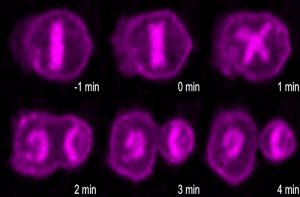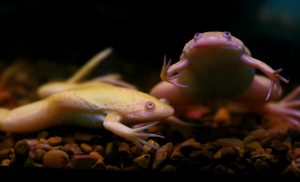Enter your address to receive notifications about new posts to your email.
Articles tagged Development
(25 results)
-
2021 Morgan Medal: Ruth Lehmann
One of life’s great mysteries is how a single egg cell can contain all the information needed to create a fully specialized complex organism, including more egg cells. Ruth Lehmann, director of the Whitehead Institute at MIT, has done a tremendous amount to solve that mystery. Beginning in her graduate student days, she uncovered a…
-
Feedback is welcome
Analysis of insulin-like signaling in C. elegans reveals extensive positive and negative feedback regulation. The insulin-like signaling system of nematode worms is comparable to that of more complex organisms; it helps regulate a wide range of the animal’s biology, including metabolism, growth, and development. This system is remarkably flexible, with the ability to maintain a…
-
Unequal divisions of death
Apoptotic pathway promotes asymmetric cell division during C. elegans development. Cell division doesn’t always produce identical daughter cells; often, the demands of multicellular development require cells to split into two quite different daughters with quite different fates. These “asymmetric” divisions are needed so that cells can differentiate and specialize, and some cells are even programmed…
-
An ancient regulator of sex development
A Wnt protein involved in the formation of the human ovary plays an important role in female zebrafish sex development. Even though zebrafish are a well-studied research model, how these fish develop into males or females remains rather obscure—in part because the sex of lab strains is not determined by sex chromosomes. Research published…
-
The hole truth about activating Torso
Holes in the plasma membrane trigger the activation of the Torso receptor tyrosine kinase. As a general rule, cells don’t do well when holes are poked in their plasma membranes. That’s why many immune cells use enzymes like perforin to puncture the membranes of pathogenic cells, dysregulating and often killing them. However, a new report…
-
Drosophila development in the drink
A fruit fly model of fetal alcohol spectrum disorder reveals a Cyclin E-centric network modifies developmental sensitivity. Alcohol exposure in utero can lead to a wide range of developmental problems, even causing fetal death in some cases. But since this exposure doesn’t always have the same outcome, is it more likely to be a problem…
-
Behind the cover: Drosophila Halloween genes
Fruit fly mutants can sometimes be grisly. Ecdysteroid hormones control aspects of fly development, including molting and metamorphosis; because aberrations in these genes lead to embryos with a ghastly appearance, they have been collectively dubbed “Halloween genes.” In a study published in GENETICS, Uryu et al. investigated how the expression of these genes is regulated.…
-
Using CRISPR for tissue-specific gene knockouts in Xenopus
Why study human diseases in frogs? For starters, 79% of genes implicated in human disease have orthologs in the African clawed frog Xenopus laevis. Frogs also produce hundreds of embryos that can be grown in a dish, meaning they can be manipulated in ways that are impractical on a large scale in mammals. For example,…
-
Frontiers of Knowledge: An Interview with 2017 Edward Novitski Prize Recipient Jonathan Hodgkin
The Genetics Society of America’s Edward Novitski Prize recognizes a single experimental accomplishment or a body of work in which an exceptional level of creativity and intellectual ingenuity has been used to design and execute scientific experiments to solve a difficult problem in genetics. The 2017 winner, Jonathan Hodgkin, used elegant genetic studies to unravel…
-
Revisiting Waddington: A new explanation for an old experiment
In the 1940s, C. H. Waddington discovered a peculiar phenomenon in fruit flies: traits could appear in response to environmental stress in an individual’s lifetime and then be passed down to future generations. Waddington proposed that this wasn’t the inheritance of acquired traits, but actually due to pre-existing genetic variation that had no effect until…
-
In Memoriam: Robert C. King (1928–2017)
Guest post by Pamela K. Mulligan and Susanne M. Gollin. Robert C. King, Professor of genetics at Northwestern University for over four decades and a pioneer in studies of Drosophila oogenesis, passed away on June 25th. He was 89. Among scientists in the field, Bob (as he was generally known) was recognized as a world-renowned geneticist,…












